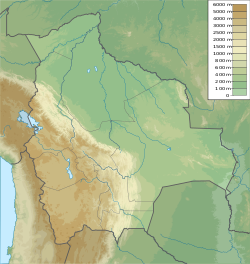Cerro Araral
| Cerro Araral | |
|---|---|
 | |
| Highest point | |
| Elevation | 5,647 m (18,527 ft)[1] |
| Coordinates | 21°37′S 68°13′W / 21.617°S 68.217°W[2] |
| Geography | |
| Location | Bolivia-Chile |
| Parent range | Andes |
Cerro Araral is an extinct volcano[3] located in the Andes on the border between Chile and Bolivia in the Potosí Department and in the Antofagasta Region. It has a height of 5647 metres, rising over a base of 3900 metres and covers an area of 109.4 square kilometres (42.2 sq mi). The edifice has a volume of 43.4 cubic kilometres (10.4 cu mi), down from 47.2 cubic kilometres (11.3 cu mi) due to erosion. Based on the erosion rate, the volcano is 1.9[1]-2.75 and forms an alignment with Cerro Ascotan. Its formation may be linked to the Altiplano-Puna Magma Body,[4] which appear to have contributed to part of Araral's magmas.[3] The modern snowline on the mountain lies at more than 5,700 metres (18,700 ft) altitude.[5] There are archeological sites at its base and on its flanks.[6] The volcanism is at first andesitic and later becomes intermediary between andesite and basalt,[7] with olivine, plagioclase and pyroxene.[4]
See also
[edit]References
[edit]- ^ a b Karátson, D.; Telbisz, T.; Wörner, G. (February 2012). "Erosion rates and erosion patterns of Neogene to Quaternary stratovolcanoes in the Western Cordillera of the Central Andes: An SRTM DEM based analysis". Geomorphology. 139–140: 122–135. Bibcode:2012Geomo.139..122K. doi:10.1016/j.geomorph.2011.10.010.
- ^ Ochsenius, Claudio (1986). "La Glaciación Puna durante el Wisconsin, Desglaciación y Máximo Lacustre en la Transición Wisconsin-Holoceno y Refugios de Megafauna Postglaciales en la Puna y Desierto de Atacama" (PDF). Revista de Geografía Norte Grande (in Spanish). 29–58 (13). Archived from the original (PDF) on 2016-03-04. Retrieved 13 September 2015.
- ^ a b Mashego, Mapaseka; González-Maurel, Osvaldo; Le Roux, Petrus; Godoy, Benigno (2023). The petrogenesis of the Pliocene Araral stratovolcano in the Andean Central Volcanic Zone (CVZ), northern Chile (PDF). GEOCONGRESS 2023 ABSTRACTS. p. 282.
- ^ a b González-Maurel, Osvaldo; le Roux, Petrus; Godoy, Benigno; Troll, Valentin R.; Deegan, Frances M.; Menzies, Andrew (15 November 2019). "The great escape: Petrogenesis of low-silica volcanism of Pliocene to Quaternary age associated with the Altiplano-Puna Volcanic Complex of northern Chile (21°10′-22°50′S)". Lithos. 346–347: 105162. doi:10.1016/j.lithos.2019.105162. ISSN 0024-4937. S2CID 201291787.
- ^ Ram Bali Singh (1 January 1992). Dynamics of Mountain Geosystems. APH Publishing. p. 165. ISBN 978-81-7024-472-1.
- ^ Stehberg, Rubén; Cárdenas, Ulises; Cerda, Juan Carlos; Stehberg, Rubén; Cárdenas, Ulises; Cerda, Juan Carlos (2023). "El Camino del Inca en el salar de Ascotán". Estudios atacameños. 69. doi:10.22199/issn.0718-1043-2023-0016. ISSN 0718-1043.
- ^ Zeil, Werner (December 1959). "Junger Vulkanismus in der Hochkordillere der Provinz Antofagasta (Chile)". Geologische Rundschau (in German). 48 (1): 218–232. Bibcode:1959GeoRu..48..218Z. doi:10.1007/BF01801827. ISSN 1432-1149. S2CID 128937768.

